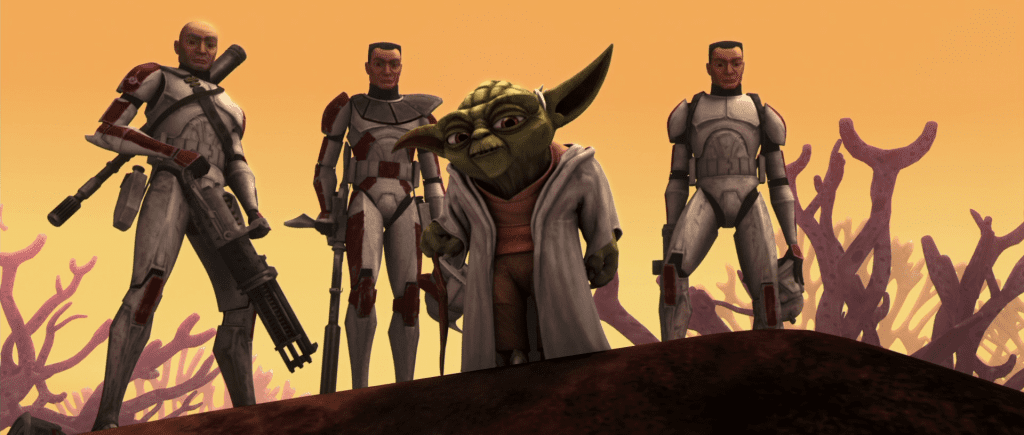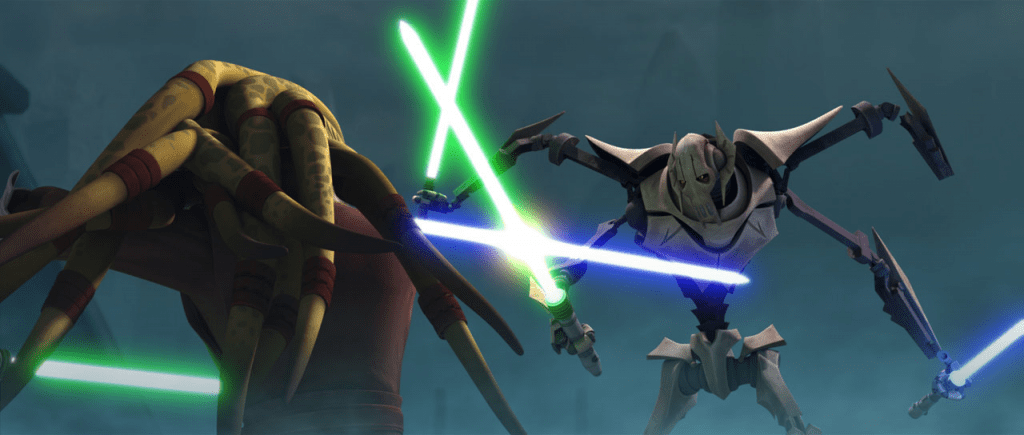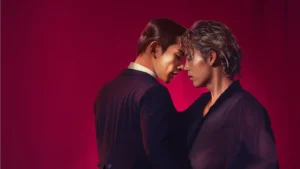Summary
While Season 1 of The Clone Wars takes a while to find its feet, it nonetheless makes the show’s vision clear and paints a promising portrait of a galaxy-spanning conflict we never got to see before.
Star Wars: The Clone Wars Season 1 is part of the current Star Wars canon.
What’s refreshing about The Clone Wars, especially Season 1, is that in the often morally-grey mythos of a galaxy far, far away, it’s pretty straight-up about being black and white. It’s an old-fashioned tale of heroes and evildoers; the Jedi and the Republic are good, the Separatists are bad, and you know each episode will have a cutesy moral message because one is literally written onscreen during the opening titles. There’s even a voiceover plucked straight from the golden age of sci-fi serials that recaps events up to this point and sets up the shenanigans of the current episode.
So far, so fan-friendly, which is exactly what The Clone Wars is intended to be. It’s not a “kid’s show”, per se, even though kids can enjoy it, because it’ll occasionally delve into some meaty territory or lop off a few heads. But it boils away the dark and broody excesses of the prequel trilogy in favor of a tone and temperament that matches the visuals; stylized, colorful, uncomplicated. This is all the more welcome in Season 1, as the show would eventually grow out of it.
Set between the events of Star Wars: Episode II – Attack of the Clones and Episode III – Revenge of the Sith, Season 1 of The Clone Wars follows the Jedi – primarily Obi-Wan, Anakin, and Ahsoka Tano – and the Clone Troopers as they quarrel over planets and territories with Count Dooku’s Separatists. It occasionally branches out to include other prequel-era Jedi or hones in on the Clones themselves, giving a brief glimpse of what it’s like in the trenches for this literal one-man army who have been bred only for war.

Of course, if you saw the mediocre movie which acted as a precursor to this show, you’ll know the setup. That thing was originally intended to be the first few episodes of this thing, and it should have been. For all its strong elements, it was overshadowed by some pretty egregious missteps, and Season 1 inherits a few of them – most notably the wacky, slapstick humor of the Separatist Battle Droids, which took the show’s “for kids” sensibilities too far, in a way that almost always undermined its flirtations with darker and edgier ideas.
Not that you necessarily want dark and edgy in a show like this, but one of the things that helped to make The Clone Wars so diverse and enduring is that it would often take complex plotlines and make them broadly accessible. One of the best episodes in Season 1 is “Rookies”, a scaled-back fight for survival that sees a squad of Clone Troopers stuck behind enemy lines. That was the point when most people – including me – realized that for all its family-friendly excesses, The Clone Wars could still be taut and engaging.
In fact, it was more taut and engaging when it wasn’t trying to be broadly accessible. It could still do humor, such as in the R2-D2-focused episode, “Duel of the Droids”, which also had the advantage of showing how the show could incorporate and build episodes around unlikely secondary characters. But it would often return to that barren comedic well with dopey heroes like the much-maligned Jar Jar Binks, who, even with a new voice actor, is no less insufferable here than he was in Star Wars: Episode I – The Phantom Menace.

But Season 1 of The Clone Wars also showed a lot of promise, particularly in how it introduced new and compelling characters and played on your knowledge of the continuity – particularly the impending Order 66 – to imperil them in a way that would never work with Obi-Wan or Anakin or Mace Windu or Yoda. Ahsoka Tano, who I insist is still this show’s greatest contribution to the canon, was often used in a strong way, and continued to be, because her absence from subsequent films makes her fate ambiguous. The writers were also free to write her personality on-the-fly, and whereas, say, Anakin could only really become the character we saw at the start of Episode III, Ahsoka could enjoy a complete and satisfying arc across all six seasons.
Elsewhere, characters like the Jedi Luminara, excellent villains such as Asajj Ventress and Cad Bane, along with Clone Trooper regulars like Captain Rex and Commander Cody, helped to flesh out the roster with unfamiliar personalities. The show’s treatment of the Clones was particularly fascinating because, despite the fact they would eventually turn on the Jedi, they were treated as three-dimensional characters with diverse outlooks on the war and their role in it. Two episodes, “Hidden Enemy” and “Innocents of Ryloth”, hammered this point home, and it remained a strong point of The Clone Wars throughout its entire run.
If this show had a purpose, it was really to prove that the Clone Wars-era of galactic history was still ripe with storytelling potential. After the prequel trilogy, people assumed not. But we never actually got to see that conflict, this apparently galaxy-spanning war that completely redefined the status quo and fundamentally altered everyone who fought in it. Season 1 of The Clone Wars goes some way towards rectifying that mistake, and while it makes many missteps and is by no means as strong as later seasons would be, it made the show’s vision clear early and ensnared a fanbase that would mostly stay with it until the end. I think that can be considered a success.




